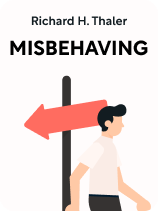

This article is an excerpt from the Shortform book guide to "Misbehaving" by Richard H. Thaler. Shortform has the world's best summaries and analyses of books you should be reading.
Like this article? Sign up for a free trial here.
What are “nudges” in behavioral economics? How does nudging influence a consumer’s decision?
Famous economist Richard H. Thaler believes that behavioral economics has important practical implications in everyday life. He believes it can help influence consumers for good with nudges.
Find out what it means to “nudge” people in the world of finance.
How “Nudging” Can Improve Consumers’ Decisions
Thaler explains that in his book Nudge, coauthored with Harvard Law professor Cass Sunstein, he argued that insights from behavioral economics can help us “nudge” consumers toward better choices, as measured by their preferences. In other words, behavioral economics can teach us how to help consumers make decisions that they want to make, but struggle to. In this article, we’ll examine two such “nudges” in behavioral economics that have been implemented in the real world: Thaler’s Save More Tomorrow plan and his reformulated letters to delinquent taxpayers in the UK.
Nudge #1: The Save More Tomorrow Plan
Thaler’s first nudge addressed a widespread problem in the US in the mid-1990s: Consumers were saving less for retirement than they wished to, by their own reports. The normal individual retirement accounts (IRAs), Thaler explains, had several problems. First, they required employees to fill out byzantine forms, selecting their interest rate and stock-to-bond allocations to opt into these retirement accounts. Second, they forced employees to see their retirement money taken out of their paycheck. And finally, they required employees to dedicate money to their retirement funds in the present, when humans have the weakest self-control, rather than deciding to add more to their retirement funds in the distant future.
(Shortform note: Perhaps as a result of these IRAs in the 1990s and 2000s, personal savings rates in the US reached a low of around 1% of disposable income in July 2005. And although these rates rose consistently in the 2010s, averaging around 9% of disposable income, data suggest that as of 2023, Americans are saving below 4% of their disposable income. Thus, because experts generally recommend saving 10-15% of disposable income, it seems that Americans are again saving too little for retirement.)
Consequently, Thaler developed the Save More Tomorrow plan to address these three problems. Rather than requiring employees to fill out elaborate forms, Save More Tomorrow included an automatic enrollment. Rather than forcing employees to see the money leave their paycheck, Save More Tomorrow allowed them to increase their retirement rates after receiving a raise, making it feel like they weren’t losing money. And rather than requiring employees to change their retirement rates now, the plan allowed them to automatically increase their rates in the future. Though it took time for Save More Tomorrow to catch on, Thaler reports that by 2011, 51% of employers offered some variation of it, and by 2013, it was estimated to help US employees save an additional $7.6 billion annually.
(Shortform note: According to some experts, automatic enrollment plans such as Save More Tomorrow have yielded mixed results for low-income employees in particular. For example, one researcher found that while automatic enrollment plans increase lower-income employees’ savings, it also causes them to incur more debt to cover expenses in the meantime. Consequently, it’s possible that automatic enrollment plans actually cause these employees to oversave, as they might be better off relying on Social Security benefits for retirement.)
Nudge #2: Letters to Delinquent Taxpayers
Thaler’s second nudge occurred in the UK, as the British government reached out to a team of behavioral scientists asking for assistance drafting letters to delinquent taxpayers. Thaler’s goal was to draft a letter that was more effective at soliciting payments from delinquent taxpayers, thus saving the British government the expense of using a collection agency. So, along with his fellow behavioral scientists, Thaler used a key insight from behavioral economics: If you’re trying to increase individuals’ compliance with a rule, the best strategy is reminding them that most other people comply with the rule.
(Shortform note: The insight that people are more likely to comply with a rule if they know others comply with it stems from a 2008 experiment, in which researchers tested the effectiveness of different messages to get guests to reuse their towels in hotel bathrooms. These researchers found that the most effective message simply informed guests that the vast majority (about 75%) of other guests who had stayed in the same room had reused their towels. By contrast, messages that exhorted guests to reuse their towels because of the environmental benefits alone were significantly less effective.)
Through several experiments, the team discovered that the most effective letters relayed two facts to delinquent taxpayers: The vast majority of British citizens pay their taxes on time, and you haven’t paid yours on time. As Thaler relates, in the three weeks after this reformulated letter was sent to taxpayers, it increased tax revenue for the British government by around £9 million (around $14.3 million using the average exchange rate for 2012, when the letter was first introduced).
(Shortform note: According to experts, Thaler’s straightforward letter is representative of a broader movement toward using simplified language in tax forms. In so doing, tax officials believe that the crucial aspects of tax forms—in this case, that delinquent taxpayers need to pay their taxes—will be made clearer and thus more understandable for taxpayers.)

———End of Preview———
Like what you just read? Read the rest of the world's best book summary and analysis of Richard H. Thaler's "Misbehaving" at Shortform.
Here's what you'll find in our full Misbehaving summary:
- Why the theory of traditional economics rests on a faulty foundation
- How consumers actually behave in economic situations
- Real-world cases of behavioral economics helping consumers






